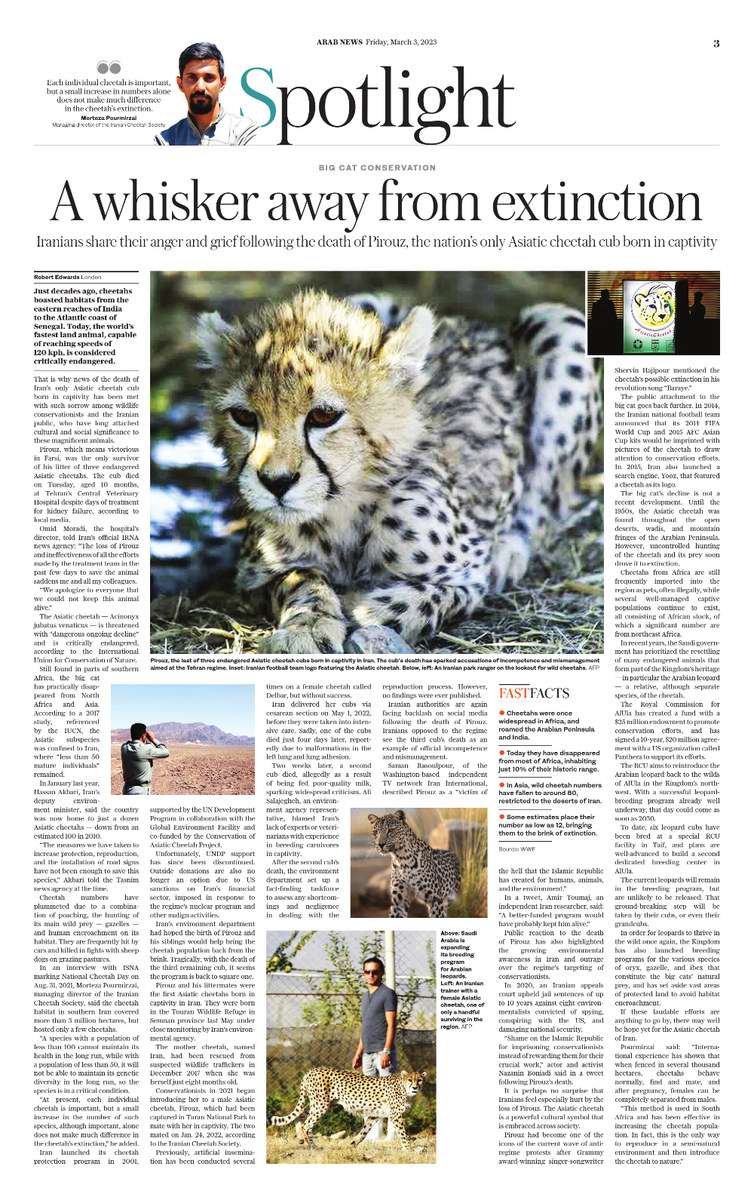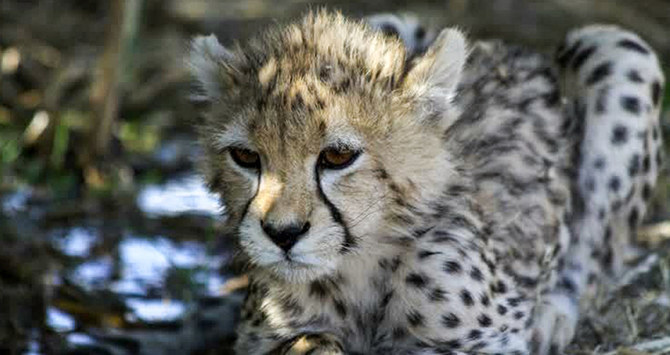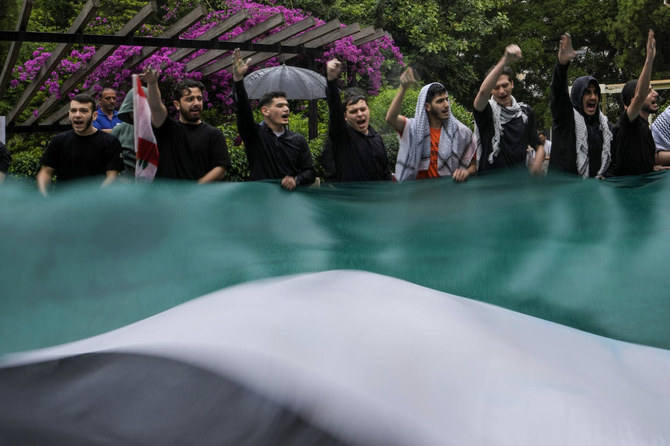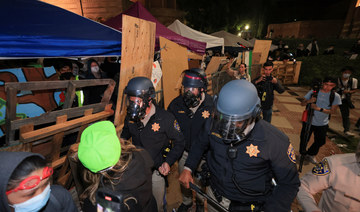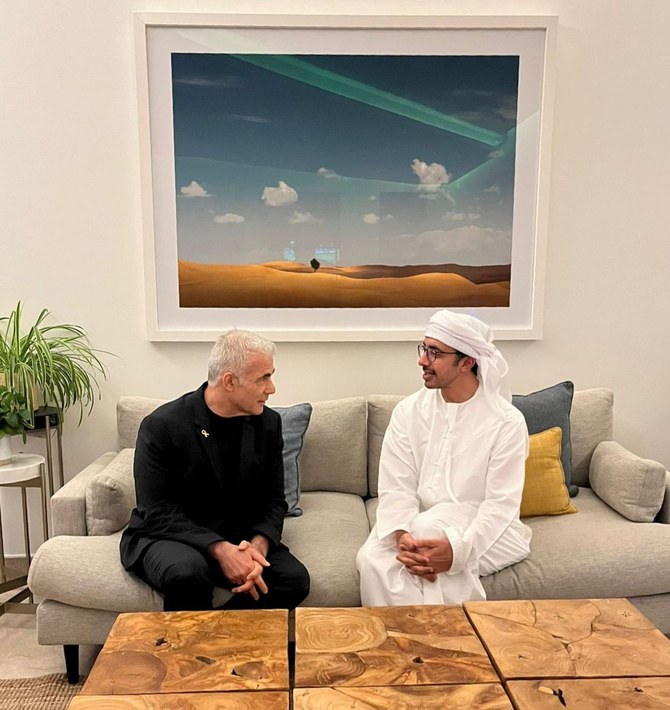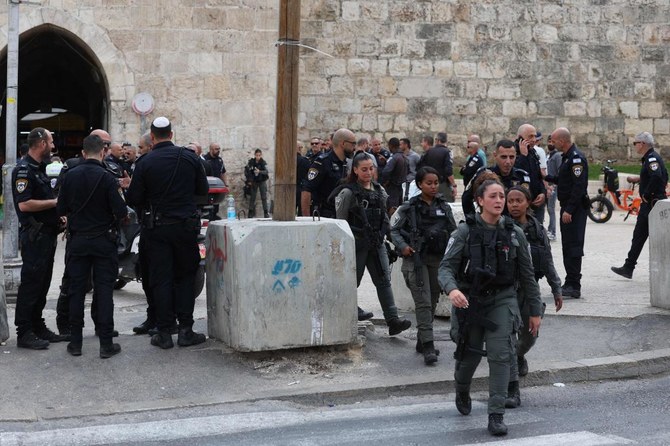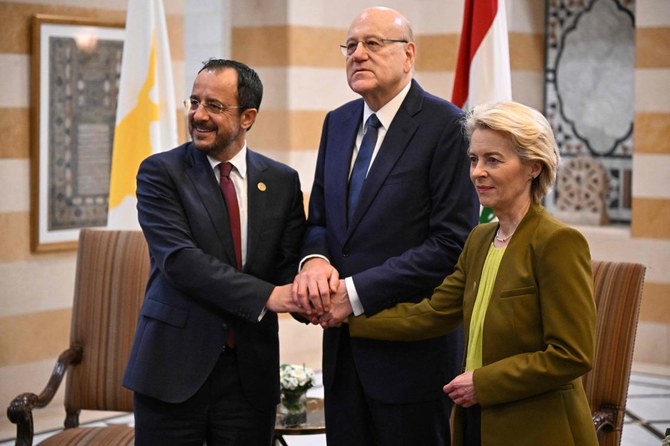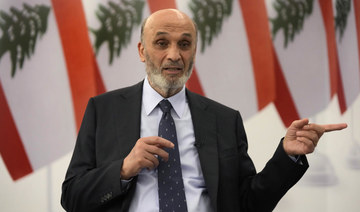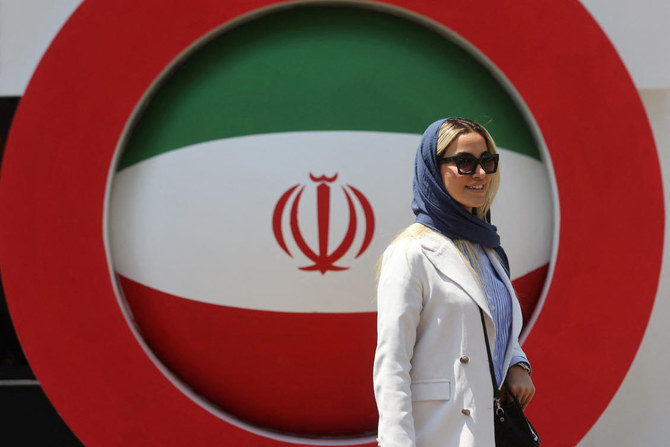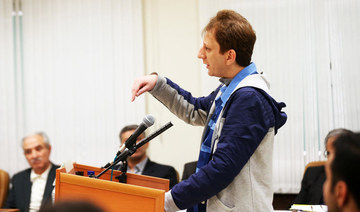LONDON: Just a matter of decades ago, cheetahs boasted habitats from the eastern reaches of India to the Atlantic coast of Senegal. Today, the world’s fastest land animal, capable of reaching speeds of 120 kilometers per hour, is considered critically endangered.
That is why news of the death of Iran’s only Asiatic cheetah cub born in captivity has been met with such sorrow among wildlife conservationists and the Iranian public, who have long attached cultural and social significance to these magnificent animals.
Pirouz, which means victorious in Farsi, was the only survivor of his litter of three endangered Asiatic cheetahs. The cub died on Tuesday, aged 10 months, at Tehran’s Central Veterinary Hospital despite days of treatment for kidney failure, according to local media.
Omid Moradi, the hospital’s director, told Iran’s official IRNA news agency: “The loss of Pirouz and ineffectiveness of all the efforts made by the treatment team in the past few days to save the animal saddens me and all my colleagues.
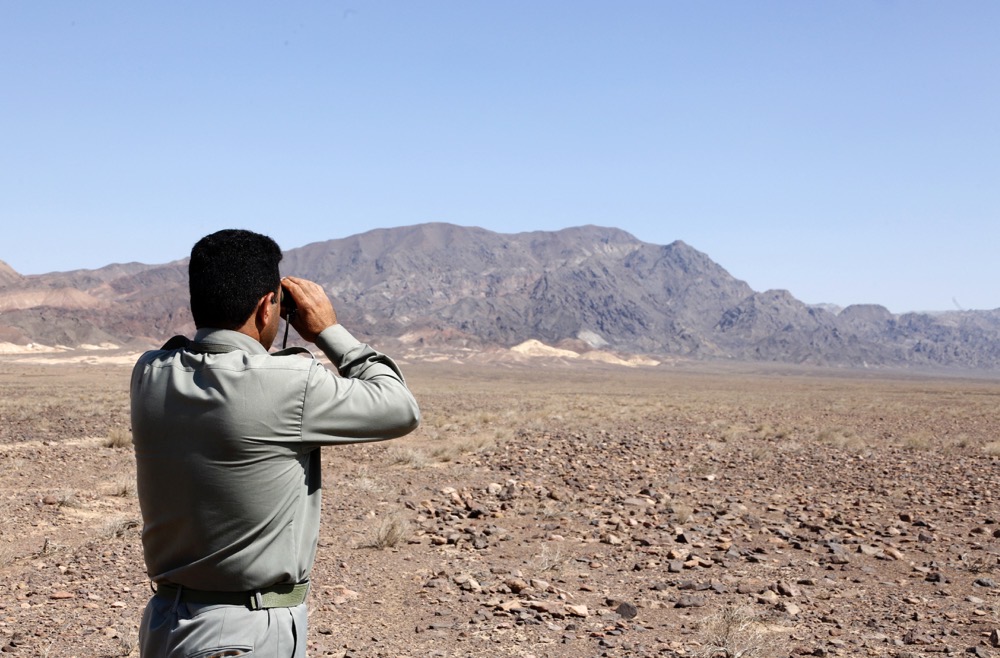
An Iranian park ranger on the lookout for wild cheetahs. (AFP)
“We apologize to everyone that we could not keep this animal alive.”
The Asiatic cheetah — Acinonyx jubatus venaticus — is threatened with “dangerous ongoing decline” and is critically endangered, according to the International Union for Conservation of Nature.
Still found in parts of southern Africa, the big cat has practically disappeared from North Africa and Asia. According to a 2017 study, referenced by the IUCN, the Asiatic subspecies was confined to Iran, where “less than 50 mature individuals” remained.
In January last year, Hassan Akbari, Iran’s deputy environment minister, said the country was now home to just a dozen Asiatic cheetahs — down from an estimated 100 in 2010.
“The measures we have taken to increase protection, reproduction, and the installation of road signs have not been enough to save this species,” Akbari told the Tasnim news agency at the time.
Cheetah numbers have plummeted due to a combination of poaching, the hunting of its main wild prey — gazelles — and human encroachment on its habitat. They are frequently hit by cars and killed in fights with sheep dogs on grazing pastures.
In an interview with ISNA marking National Cheetah Day on Aug. 31, 2021, Morteza Pourmirzai, managing director of the Iranian Cheetah Society, said the cheetah habitat in southern Iran covered more than 3 million hectares, but hosted only a few cheetahs.
“A species with a population of less than 100 cannot maintain its health in the long run, while with a population of less than 50, it will not be able to maintain its genetic diversity in the long run, so the species is in a critical condition.
“At present, each individual cheetah is important, but a small increase in the number of such species, although important, alone does not make much difference in the cheetah’s extinction,” he added.
Iran launched its cheetah protection program in 2001, supported by the UN Development Program in collaboration with the Global Environment Facility and co-funded by the Conservation of Asiatic Cheetah Project.
Unfortunately, UNDP support has since been discontinued. Outside donations are also no longer an option due to US sanctions on Iran’s financial sector, imposed in response to the regime’s nuclear program and other malign activities.
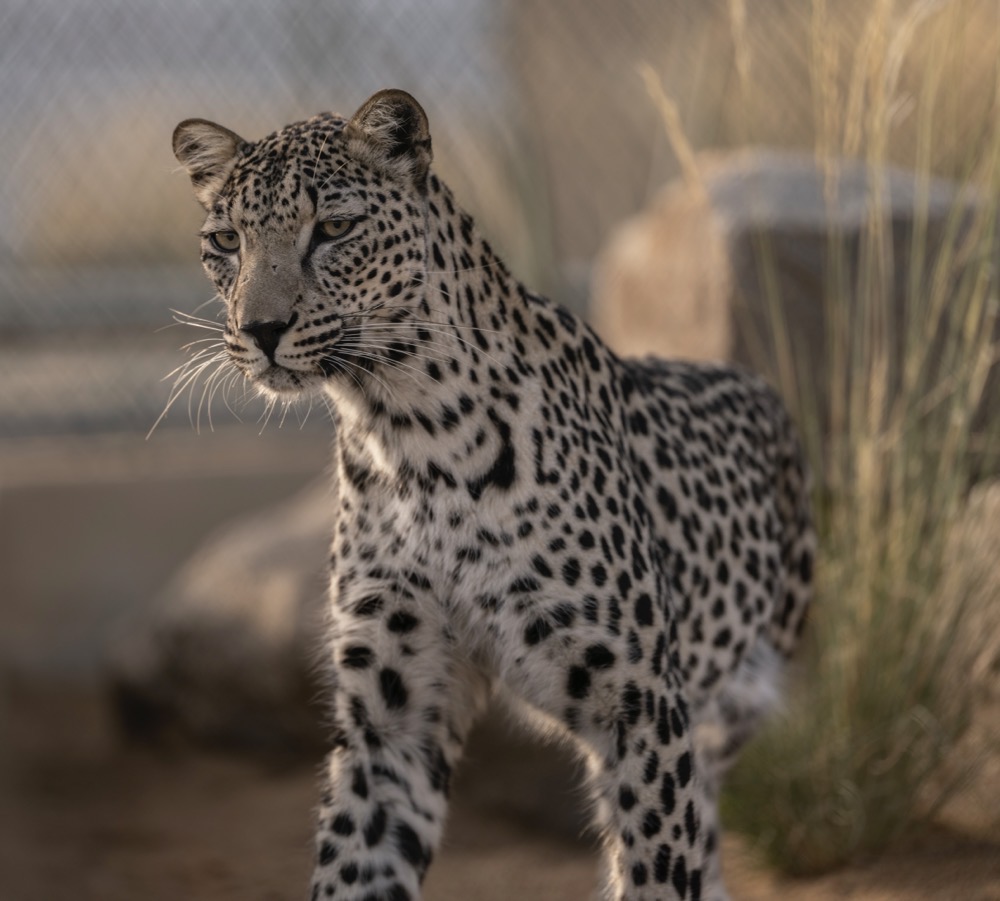
Saudi Arabia is expanding its breeding program for Arabian leopards. (AFP)
Iran’s environment department had hoped the birth of Pirouz and his siblings would help bring the cheetah population back from the brink. Tragically, with the death of the third remaining cub, it seems the program is back to square one.
Pirouz and his littermates were the first Asiatic cheetahs born in captivity in Iran. They were born in the Touran Wildlife Refuge in Semnan province last May under close monitoring by Iran’s environmental agency.
The mother cheetah, named Iran, had been rescued from suspected wildlife traffickers in December 2017 when she was herself just eight months old.
Conservationists slowly began introducing her to a male Asiatic cheetah, Firouz, in 2021, who had been captured in Turan National Park to mate with her in captivity. The two eventually mated on Jan. 24, 2022, according to the Iranian Cheetah Society.
Previously, artificial insemination has been conducted several times on a female cheetah called Delbar, but without success.
Iran delivered her cubs via cesarean section on May 1, 2022, before they were taken into intensive care. Sadly, one of the cubs died just four days later, reportedly due to malformations in the left lung and lung adhesion.
Two weeks later, a second cub died, allegedly as a result of being fed poor-quality milk, sparking widespread criticism. Ali Salajegheh, an environment agency representative, blamed Iran’s lack of experts or veterinarians with experience in breeding carnivores in captivity.
FASTFACTS
• Cheetahs were once widespread in Africa and roamed the Arabian Peninsula and India.
• Today they have disappeared from most of Africa, inhabiting just 10% of their historic range.
• In Asia, wild cheetah have declined to around 80 individuals, restricted to the deserts of Iran.
• Some estimates place their number as low as 12, bringing them to the brink of extinction.
(Source: WWF)
After the second cub’s death, the environment department set up a fact-finding taskforce to assess any shortcomings and negligence in dealing with the reproduction process. However, no findings were ever published.
Iranian authorities are again facing backlash on social media following the death of Pirouz. Iranians opposed to the regime see the third cub’s death as an example of official incompetence and mismanagement.
Saman Rasoulpour of the Washington-based independent TV network Iran International described Pirouz as a “victim of the hell that the Islamic Republic has created for humans, animals, and the environment.”
In a tweet, Amir Toumaj, an independent Iran researcher, said: “A better-funded program would have probably kept him alive.”
Public reaction to the death of Pirouz has also highlighted the growing environmental awareness in Iran and outrage over the regime’s targeting of conservationists.
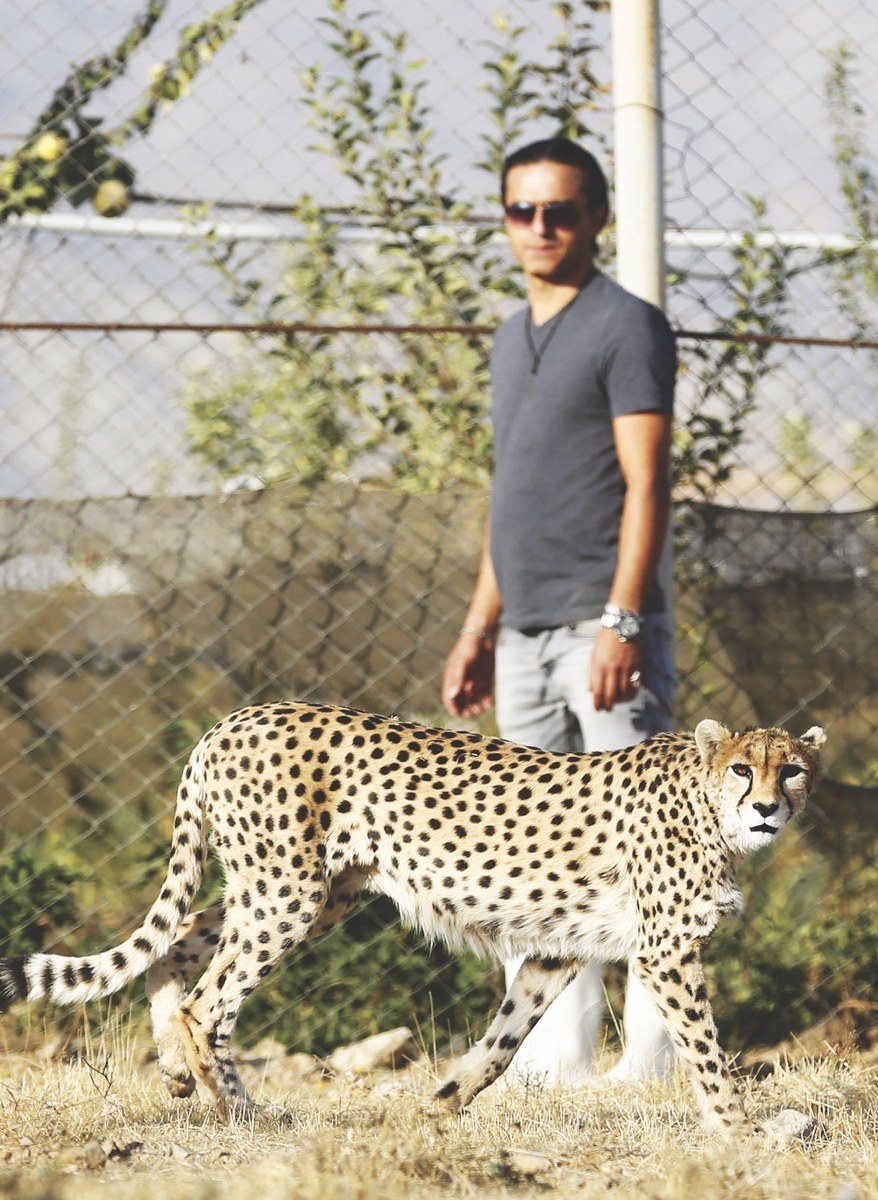
An Iranian trainer with a female Asiatic cheetah, one of only a handful surviving in the region. (AFP)
In 2020, an Iranian appeals court upheld jail sentences of up to 10 years against eight environmentalists convicted of spying, conspiring with the US, and damaging national security.
“Shame on the Islamic Republic for imprisoning conservationists instead of rewarding them for their crucial work,” actor and activist Nazanin Boniadi said in a tweet following Pirouz’s death.
It is perhaps no surprise that Iranians feel especially hurt by the loss of Pirouz. The Asiatic cheetah is a powerful cultural symbol that is embraced across society.
Pirouz had become one of the icons of the current wave of anti-regime protests after Grammy award-winning singer-songwriter Shervin Hajipour mentioned the cheetah’s possible extinction in his revolution song “Baraye.”
The public attachment to the big cat goes back further. In 2014, the Iranian national football team announced that its 2014 FIFA World Cup and 2015 AFC Asian Cup kits would be imprinted with pictures of the cheetah to draw attention to conservation efforts. In 2015, Iran also launched a search engine, Yooz, that featured a cheetah as its logo.
The big cat’s decline is not a recent development. Until the 1950s, the Asiatic cheetah was found throughout the open deserts, wadis, and mountain fringes of the Arabian Peninsula. However, uncontrolled hunting of the cheetah and its prey soon drove it to extinction.
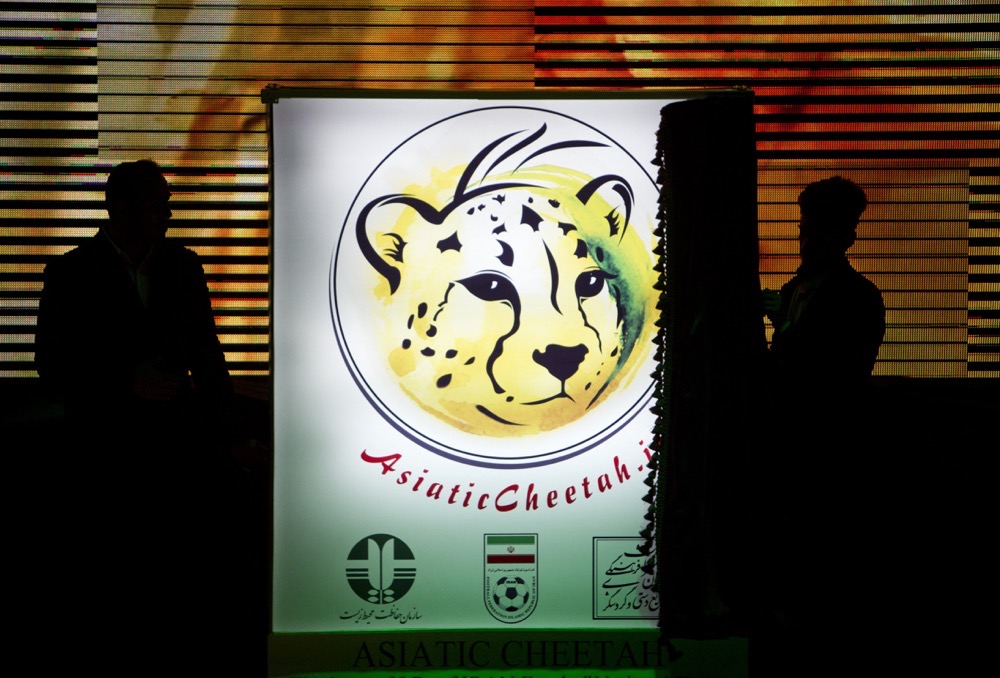
Iranian football team logo featuring the Asiatic cheetah. (AFP)
Cheetahs from Africa are still frequently imported into the region as pets — often illegally — while several well-managed captive populations continue to exist, all consisting of African stock, of which a significant number are from northeast Africa.
In recent years, the Saudi government has prioritized the resettling of many endangered animals that form part of the Kingdom’s heritage — in particular the Arabian leopard — a relative, although separate species, of the cheetah.
The Royal Commission for AlUla has created a fund with a $25 million endowment to promote conservation efforts, and has signed a 10-year, $20 million agreement with a US organization called Panthera to support its efforts.
The RCU aims to reintroduce the Arabian leopard back to the wilds of AlUla in the Kingdom’s northwest. With a successful leopard-breeding program already well underway, that day could come as soon as 2030.
To date, six leopard cubs have been bred at a special RCU facility in Taif, and plans are well-advanced to build a second dedicated breeding center in AlUla.
The current leopards will remain in the breeding program but are unlikely to be released. That ground-breaking step will be taken by their cubs, or even their grandcubs.
In order for leopards to thrive in the wild once again, the Kingdom has also launched breeding programs for the various species of oryx, gazelle, and ibex that constitute the big cats’ natural prey, and has set aside vast areas of protected land to avoid habitat encroachment.
If these laudable efforts are anything to go by, there may well be hope yet for the Asiatic cheetah of Iran.
Pourmirzai said: “International experience has shown that when fenced in several thousand hectares, cheetahs behave normally, find and mate, and after pregnancy, females can be completely separated from males.
“This method is used in South Africa and has been effective in increasing the cheetah population. In fact, this is the only way to reproduce in a semi-natural environment and then introduce the cheetah to nature.”
